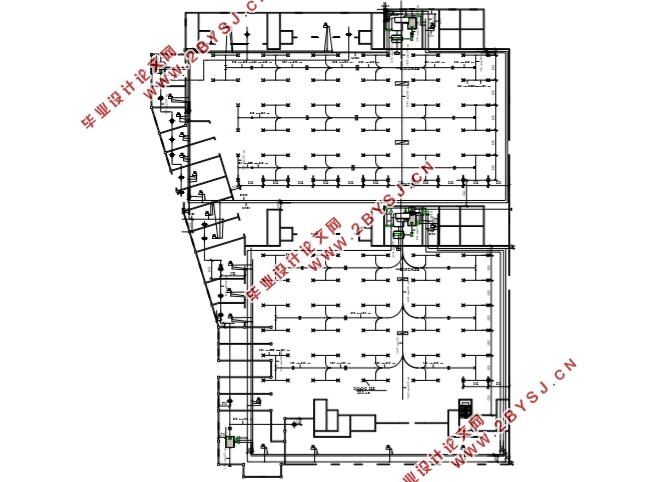南京市大型商场空调设计
无需注册登录,支付后按照提示操作即可获取该资料.
南京市大型商场空调设计(设计说明书16000字,PDF图9张)
摘要
本设计为南京市某大型商场冷热源及空调系统设计,拟为之设计合理的空调系统,为室内人员提供舒适的工作环境。
通过非稳态谐波反应法进行冷负荷的逐时计算,通过热面积指标法进行热负荷的计算。空调冷热源方案进行经济性比较,选用螺杆式水冷机组+(燃油)锅炉供热。空调风系统采用吊顶风机加屋顶式新风系统,以便各空调房间互不干扰,独立调节室内温湿度。空调水系统采用机械循环两管制一次泵定流量闭式系统,系统支管内大部分为异程布置,小部分为同程布置,支路间异程异程布置。空调区域及其他利用自然排风。建筑防排烟系统对地下一层、电梯前室和封闭的走廊、房间设置机械排烟,其余区域采用自然排烟。
本设计内容包括:空调冷热负荷计算:空调冷热源方案比较;空调风系统的选型及计算:空调水系统的选型及计算;水力计算;计:其他设备的选型;节能、保温与防腐以及减振和消声等内容。
关键字:冷热源,空调水系统,能耗
Air conditioning design of a large shopping mall in nanjing
Abstract
The design for a large shopping mall in nanjing cold and heat source and air conditioning system design, to design a reasonable air conditioning system for the indoor staff to provide a comfortable working environment.
The unsteady harmonic response method was used to calculate the cooling load hour by hour and the thermal area index method was used to calculate the heating load. Comparing the heat and cold source schemes of air conditioning, screw water cooling unit + (fuel)boiler is selected for heating. The air conditioning system adopts ceiling fan and roof type fresh air system, so that the air conditioning rooms dc rot interfere with each other.
independently adjust indoor temperature and humidity The water system of air conditioning adopts the closed system of mechanical circulation, two pipes and one pump: with fixed flow
Most of the branch pipes of the system are arranged differently a small part of them are arranged in the same way, and the branch roads are arranged differently. Air-conditioning area and other use of natural exhaust The smoke prevention and exhaust system of the building sets mechanical smoke exhaust on the first floor underground, elevator front room, closed corridor and room, and the rest areas adopt natural smoke exhaust.
This design includes: cold and heat load calculation of air conditioning: comparison of cold and heat source schemes of air conditioning;Selection and
calculation of air conditioning system: selection and calculation of air conditioning water system; Hydraulic calculation;Computer: selection of other equipment; Energy saving, heat preservation and anticorrosion, vibration and noise reduction, etc.
Keywords:cold and heat source,air conditioning water system,energy consumption.
建筑概况
本设计位于南京市,为某大型商场,空调设计针对其中一层,所需设计空调面积近16000平方米。需进行制冷机房、空调、通风、消防等设计。


目录
第一章 设计概况 1
1.1建筑概况 1
1.2设计参数 1
1. 室外设计参数 1
2.室内设计参数 2
1.3冷热源方案 2
第二章 负荷计算 5
2.1空调负荷计算一般规定 5
2.2逐时冷负荷计算 9
2.3峰值负荷计算 10
2.4湿负荷的计算方法 12
2.5热负荷计算 13
2.6热负荷估算 17
第三章设备选型 18
第四章 空调冷源 20
4.1设备选型 20
4.2冷却塔设计计算 20
4.3分水器与集水器设计计算 20
4.4空调水系统管路的水力计算 21
4.4.1冷冻水循环水量和冷却水循环水量的计算 21
4.4.2冷冻水、冷却水管路的水力计算 23
4.5水泵计算 25
4.5.1 冷冻水泵选型计算 25
4.5.2 冷却水泵计算 26
4.6保温与防腐 27
4.6.1 管道保温 27
4.6.2管道防腐 28
第五章 空调热源 29
5.1 锅炉型号及台数的选择 29
5.2燃气供应系统的设计 29
5.2.1确定供气系统方案 29
5.2.2燃气管道设计 29
5.2.3调压系统设计 30
5.2.4放散系统设计 30
5.4 锅炉给水管路、循环水管路的水力计算 30
5.4.1等温降法 30
5.5 锅炉补水系统 33
5.6换热器 34
第六章 空调方案的选择 36
6.1空调系统的确定 36
第七章 空调系统的计算 40
7.1新风量的计算 40
7.2风系统的风量计算 40
第八章 空调处理设备的选型 44
8.1风机盘管的选型 44
8.2新风机的选型 44
第九章 风系统的计算 46
9.1气流组织方案 46
9.2气流组织计算 47
9.2.1 回风口的选择计算 47
9.3通风管道的材料及形式 48
第十章 风管、水管的水力计算 49
10.1风管水利计算步骤 49
10.2水管的水力计算 50
第十一章 管道的防腐和保温 72
11.1管道的材料 72
11.2管道的防腐 72
11.3管道的保温 73
参考文献 74
附表 75
